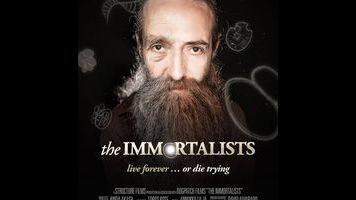The Immortalists makes light of scientists pursuing the “cure” to death

“Because I could not stop for death / He kindly stopped for me / The carriage held but just ourselves / And immortality.” So wrote poet Emily Dickinson of the one human inevitable. And though most people accept that life ends eventually, there are several—like the two subjects of David Alvarado and Jason Sussberg’s slight, occasionally off-putting documentary, The Immortalists—who like to think otherwise.
Bill Andrews and Aubrey De Grey are career scientists born a continent apart, the former in the U.S., the latter in the U.K. Andrews is the more outwardly approachable—an easygoing health nut and ultra-marathon runner whose company, Sierra Sciences, is working on an aging “cure” via the manipulation of the telomerase enzyme. De Grey is much more of a character, with his Alan Moore-like beard, high tolerance for alcohol, and colorful personal life (the particulars of which the filmmakers dubiously dole out over the course of the movie, as if giving him rope to hang himself). He is co-founder of the SENS Research Foundation, which is committed to the discovery and creation of an anti-aging medicine.
The fact that most humans accept death and the many infirmities that lead to it is, for both men, a deep, depressing horror, and they’re convinced there is another way—that life can be extended for centuries, if not infinitely. This is a provocative topic to explore, but at a mere hour and change, Alvarado and Sussberg barely have time to scratch the surface. They’re more interested in reveling in Andrews and De Grey’s numerous idiosyncrasies. (Really, the whole film feels like cut-rate Errol Morris.) They follow Andrews to the Himalayas as he prepares to re-run an ultra-marathon that nearly killed him a few years before, as well as marry his long-time girlfriend in a Buddhist ceremony. (She speaks enthusiastically about their lifelong—as in truly eternal—commitment to each other.) And the filmmakers never miss an opportunity to capture De Grey doing something strange and unconventional. Nudist roadside picnic, anyone?
This floundering about in both men’s eccentric natures has the unfortunate effect of demeaning them and devaluing their work. Certainly there’s a conversation to be had about the advisability and the morality (as well as the philosophical underpinnings) of seeking eternal life. The most interesting parts of The Immortalists are the scenes in which Andrews and De Grey have their suppositions directly challenged—sometimes by each other, sometimes by fellow colleagues—and are forced to defend their perspectives. It’s thrilling to watch Andrews win over a conference hall crowd (he often speaks publicly as a way of securing financial backing for his research) or observe as De Grey debates an Oxford University professor who considers the desire to cheat death a highly naïve proposition. They both have an intelligence and allure that makes this most science fictional of propositions seem well within the realm of possibility. Is it better to recoil or rejoice? Would that the film encouraged some deeper thought on the matter instead of inviting viewers to gawk at the subjects as if they were freak-show attractions.